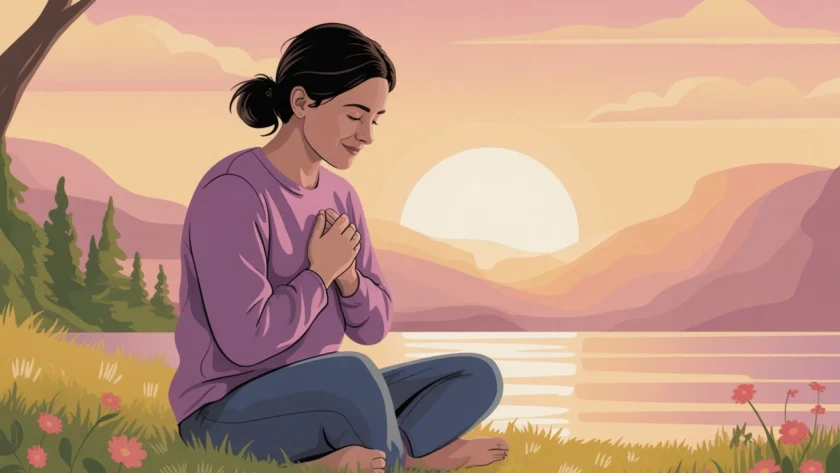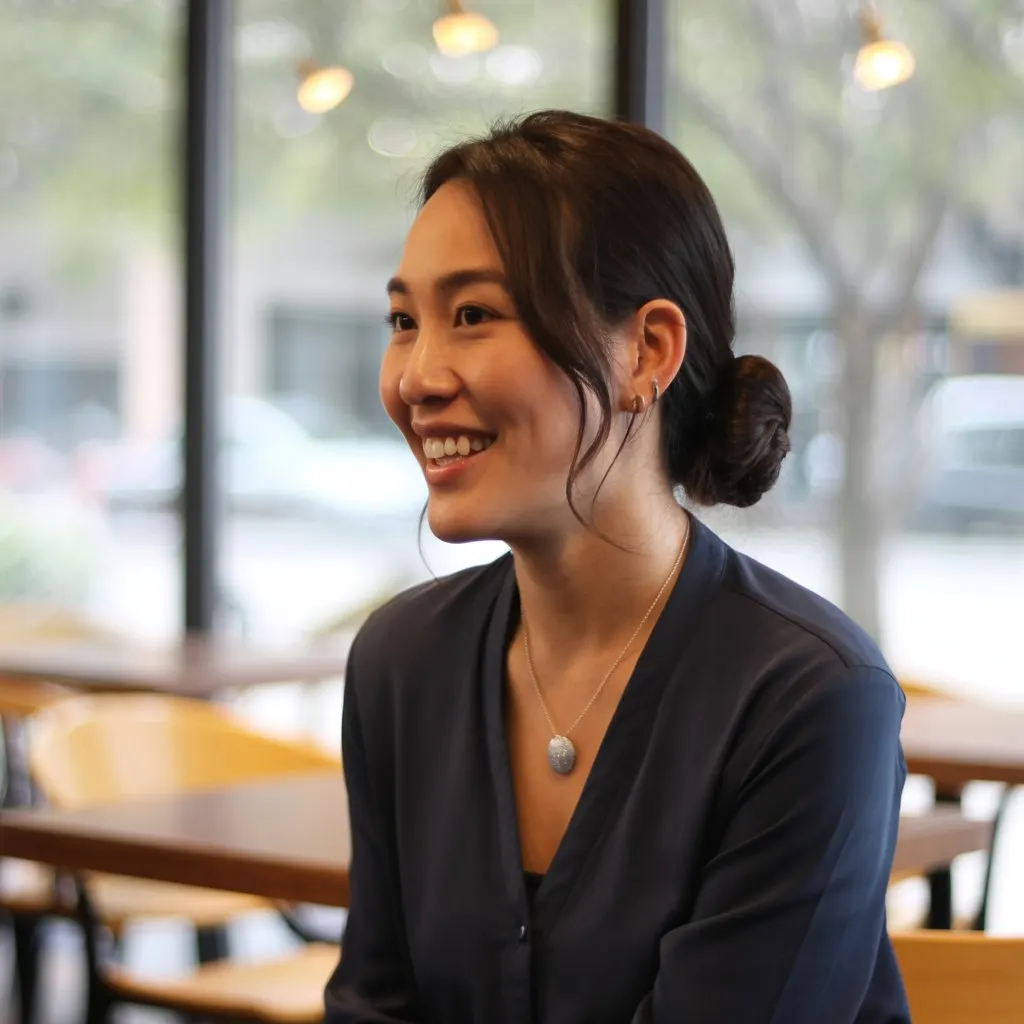I was sitting at my kitchen table last Tuesday morning, coffee getting cold, mind already spinning through my worry list for the day. You know that feeling—when your brain starts cataloging everything that could go wrong before you’ve even brushed your teeth? That’s when Bailey, my rescue dog, nudged my hand with his nose, and I realized I’d been so caught up in anxious thoughts that I hadn’t even noticed him sitting there patiently waiting for his morning scratch behind the ears.
That small moment pulled me back to something I’ve learned over and over in my own anxiety journey: gratitude has this remarkable ability to interrupt the spiral. It’s not some magical cure-all that makes anxiety disappear in a puff of smoke, but here’s what I’ve discovered—gratitude is one of the most powerful tools we have for shifting our focus from fear to faith, from worry to wonder.
If you’re reading this while your heart’s racing or your mind’s churning through worst-case scenarios, I want you to know something important: practicing gratitude doesn’t mean pretending everything’s fine or slapping a happy face on real struggles. It means training our hearts to notice God’s goodness even when anxiety is loud.
Why Gratitude Works When Anxiety Strikes
Let me share something that changed how I understand the connection between gratitude and anxiety relief. Our brains literally can’t fully focus on grateful thoughts and anxious thoughts at the same time. It’s like trying to drive in two directions simultaneously—something’s got to give.
When I first heard this from my Christian counselor years ago, I was skeptical. I thought, “Sure, but my anxiety is about real things—how is being thankful for my coffee supposed to help with my actual problems?” What I’ve come to understand is that gratitude doesn’t dismiss our real concerns. Instead, it creates space in our minds for perspective.
The apostle Paul knew something profound when he wrote, “Do not be anxious about anything, but in every situation, by prayer and petition, with thanksgiving, present your requests to God” (Philippians 4:6). Notice that word—thanksgiving. Paul didn’t say to just pray about our worries. He specifically linked prayer with gratitude as the pathway to peace.
Gratitude practices actually rewire our brains over time. When we consistently notice and name the good things—even tiny things—we’re building new neural pathways. We’re training our minds to spot evidence of God’s faithfulness instead of only seeing potential threats. And here’s what I’ve experienced firsthand: the more I practice gratitude, the less power my anxious thoughts have over me.
The Biblical Foundation for Gratitude Practices
I grew up thinking gratitude was just about being polite—saying thank you when someone passed the potatoes. But Scripture paints a much richer picture. Gratitude is actually a spiritual discipline that transforms how we see God, ourselves, and our circumstances.
David wrote in Psalm 34:1, “I will extol the Lord at all times; his praise will always be on my lips.” At all times. Not just when things are going well, but in the middle of anxiety and fear too. That same psalm continues, “I sought the Lord, and he answered me; he delivered me from all my fears” (Psalm 34:4). David connected praise with deliverance from fear.
When we cultivate gratitude, we’re essentially practicing God’s presence. We’re training ourselves to notice where He’s been faithful, where He’s provided, where He’s shown up in small ways we might otherwise miss. It’s like developing spiritual vision that can see beyond our immediate anxiety to the bigger story God is writing.
Starting Small: Simple Gratitude Practices for Anxious Minds
Here’s what I wish someone had told me when I first started trying to practice gratitude during my worst anxiety seasons: you don’t have to feel grateful to practice gratitude. Let me say that again because it’s really important. You don’t need to manufacture warm fuzzy feelings. You just need to start noticing.
The Morning Three
Before you check your phone or dive into your worry list, name three specific things you’re grateful for. And I mean specific—not just “my family” but “the way my daughter laughed at breakfast yesterday” or “that I have hot water for my shower.” This practice takes maybe two minutes, but it sets a different tone for your entire day.
I started doing this about five years ago, and I’ll be honest—some mornings it felt like I was grasping at straws. “I’m grateful for… uh… my pillow?” But even on those days, the simple act of searching for something to appreciate interrupted my automatic anxiety response.
The Anxiety Interrupt
When you notice anxiety building, pause and identify five things you can see right now that you appreciate. This technique combines mindfulness with gratitude and works because it grounds you in the present moment while shifting your focus. I’ve done this in parking lots during panic attacks, in waiting rooms before appointments, even at my desk when work stress overwhelms me.
It might sound like: “I’m grateful for the tree outside my window, for this comfortable chair, for the fact that I can breathe deeply, for the color blue, for my hands that work.” Simple. Present. Specific.
The Evening Review
Before bed, spend five minutes reviewing your day specifically looking for evidence of God’s presence. Where did you see His provision? His protection? His peace? Maybe it was a conversation that went better than expected, a small solution to a problem, or simply the strength to get through a hard day.
I keep a small journal on my nightstand—nothing fancy, just a regular notebook—and I jot down these observations. On really anxious days, I flip back through previous entries and remind myself that God has been faithful before.
Deepening Your Practice: Gratitude Exercises That Transform
Once you’ve built a foundation with simple daily practices, these deeper exercises can amplify gratitude’s impact on your anxiety levels.
The Gratitude Letter
Think of someone who has made a positive difference in your life—maybe they helped you through a difficult season or simply showed you consistent kindness. Write them a letter expressing specific ways they’ve blessed you. You don’t even have to send it, though it’s incredibly powerful if you do.
I wrote one to my college roommate who sat with me during my first panic attack and didn’t make me feel crazy. Writing that letter, remembering her compassion, reminded me that God has always provided people to walk beside me. It shifted my perspective from “I’m alone in this anxiety” to “God has surrounded me with love.”
The Anxiety Reframe Journal
This one’s been a game-changer for me. When something triggers anxiety, write down the worry. Then, challenge yourself to find three things you can be grateful for within that same situation. It sounds counterintuitive, but stick with me.
For example: “I’m anxious about my job interview tomorrow.” Reframe: “I’m grateful I have skills that make me employable, that I have the opportunity to potentially grow, and that God has provided for me through every job transition before.”
This isn’t toxic positivity—it’s choosing to see the fuller picture. Anxiety narrows our vision to only see threats. Gratitude widens it to see possibilities and God’s track record.
The Sensory Gratitude Walk
Take a walk specifically to engage your senses and practice gratitude for what you notice. What do you smell? The neighbor’s dinner cooking, fresh-cut grass, rain in the air? What do you hear? Birds, children playing, wind in the trees? What do you see that reflects God’s creativity?
I do this with Bailey at least twice a week, and it never fails to quiet my anxious mind. There’s something about physically moving your body while intentionally noticing beauty that interrupts the anxiety loop. Plus, it’s a way to practice Psalm 46:10—”Be still, and know that I am God”—even while you’re moving.
Gratitude in Community: Practicing Together
One thing I’ve learned is that gratitude grows when it’s shared. Anxiety thrives in isolation, convincing us we’re the only ones struggling. Gratitude practices in community break that isolation and multiply the benefits.
The Gratitude Share
If you’re part of a small group or Bible study, try opening each meeting by having everyone share one thing they’re grateful for from the past week. Keep it simple and don’t let it become performative. Some weeks, people share huge blessings. Other weeks, someone says, “I’m grateful I got out of bed today,” and that’s absolutely valid.
I’ve watched this practice transform our women’s group. It creates connection, reminds us we’re not alone, and builds our collective faith as we witness God’s faithfulness in each other’s lives.
The Family Gratitude Ritual
At dinner or before bed, have each family member share their high and low from the day, then one thing they’re grateful for. Kids especially benefit from learning that we can acknowledge hard things while still noticing good things.
My friend Sarah does this with her teenagers, and she told me it’s become the most meaningful part of their day. Even her anxious daughter, who tends toward negativity, is slowly learning to spot blessings.
When Gratitude Feels Impossible: Grace for the Hard Days
Let’s talk about what to do when anxiety is so overwhelming that gratitude feels not just difficult but impossible. Because if you’re anything like me, you’ve had those days when someone suggesting you “just be grateful” makes you want to scream.
Here’s the truth I’ve had to learn: on our hardest days, sometimes the most radical act of gratitude is simply thanking God that the day will eventually end. That’s not giving up—that’s honest faith.
Psalm 77 has been my companion on these days. The psalmist asks, “Will the Lord reject forever? Will he never show his favor again?” (Psalm 77:7). He’s honest about his despair. But then he deliberately redirects: “Then I thought, ‘To this I will appeal: the years when the Most High stretched out his right hand. I will remember the deeds of the Lord; yes, I will remember your miracles of long ago'” (Psalm 77:10-11).
Sometimes practicing gratitude means simply remembering that God has been faithful before, even when we can’t feel His presence now. It’s okay if your gratitude practice on hard days is just whispering, “Thank you that I’m breathing. Thank you that this feeling will pass. Thank you that you haven’t left me.”
That’s enough. You’re enough. God meets us in our honest struggle.
Building a Sustainable Gratitude Practice
The key to making gratitude work for anxiety relief isn’t perfection—it’s consistency. I’ve learned that a simple practice done daily beats an elaborate one done occasionally.
Start with One Practice
Choose just one gratitude exercise from this article that resonates with you. Don’t try to implement everything at once. I started with just the morning three and did that for six months before adding anything else.
Link It to an Existing Habit
Pair your gratitude practice with something you already do daily. I practice gratitude while my coffee brews every morning. That existing routine makes it easier to remember and sustain the new practice.
Give Yourself Grace
You’ll forget some days. You’ll have days when gratitude feels forced or fake. That’s normal. The practice still works even when it feels mechanical. Keep showing up.
Track Your Progress
Notice how your anxiety levels shift over time. I didn’t realize how much my gratitude practice was helping until I looked back at my journal after three months and saw a clear pattern: the days I practiced gratitude were consistently less anxious than the days I didn’t.
The Transformation That Comes With Time
I can’t promise that gratitude practices will eliminate your anxiety completely. My anxiety hasn’t disappeared, and I still have days when worry feels overwhelming. But what I can tell you is that gratitude has fundamentally changed my relationship with anxiety.
Where I used to feel powerless against anxious thoughts, I now have a tool that helps me shift my focus. Where I used to spiral into worst-case scenarios, I’m learning to notice evidence of God’s faithfulness. Where I used to feel alone in my struggle, gratitude has connected me to a community of people practicing the same thing.
Paul’s promise in Philippians 4:6-7 has become real in my life: “Do not be anxious about anything, but in every situation, by prayer and petition, with thanksgiving, present your requests to God. And the peace of God, which transcends all understanding, will guard your hearts and your minds in Christ Jesus.”
That peace doesn’t always look like the absence of anxiety. Sometimes it looks like anxiety being present but not in control. It looks like being able to notice both my fear and God’s faithfulness. It looks like a heart that can hold both struggle and gratitude.
Your Next Step Forward
If you’re reading this and feeling overwhelmed by anxiety right now, can I encourage you to do something really simple? Before you click away from this article, take sixty seconds to name three specific things you’re grateful for today. Not general things, but specific, concrete details.
Maybe it’s the warm mug in your hands, the fact that your body is breathing without you having to think about it, or the way the light is coming through your window. Start there. That’s enough for today.
Tomorrow, try it again. And the next day. Give yourself thirty days of practicing gratitude—not perfectly, just consistently—and notice what shifts. I truly believe you’ll start to see anxiety lose some of its grip.
You’re not alone in this struggle, friend. God is with you in the anxious moments, and He’s given us gratitude as one way to remember that truth. It’s not about pretending everything’s fine. It’s about learning to see His faithfulness even when anxiety is loud.
And that, I’ve discovered, changes everything.




